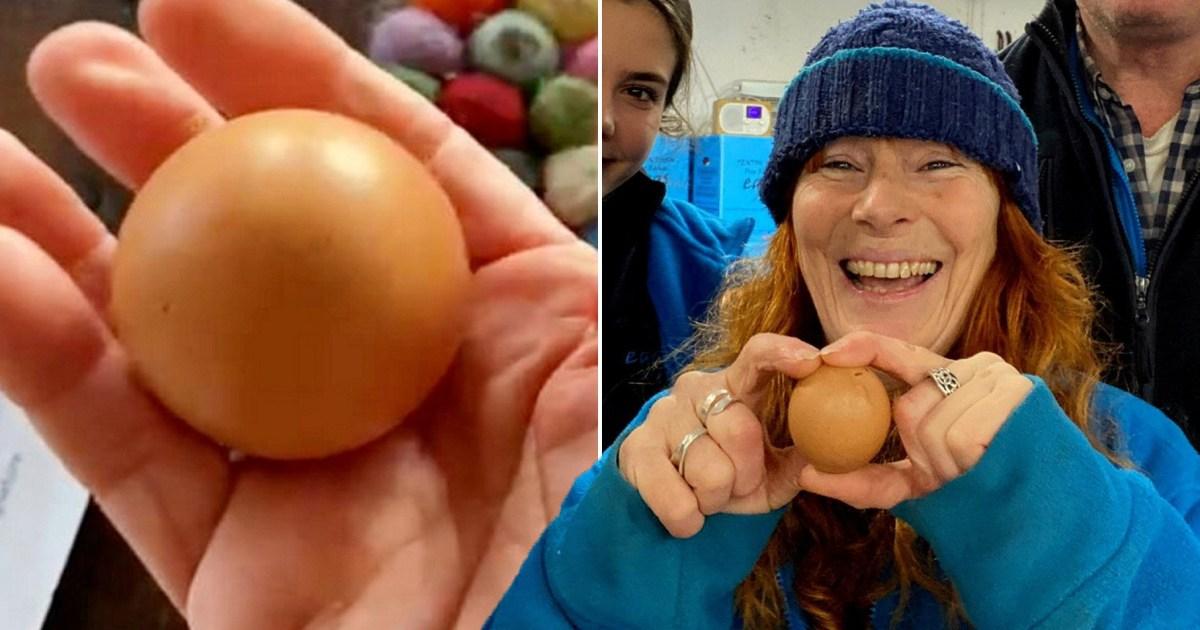Facebook users shared a photo and story in March 2025, claiming bears formed an “unprecedented blockade” at an entrance to Yellowstone National Park.
Related Posts

Rare ‘one-in-a-billion’ spherical egg to be auctioned off
To view this video please enable JavaScript, and consider upgrading to a web browser that supports HTML5 video Up Next Previous Page Next Page An extremely rare, completely round egg has been found by a shell-shocked farm worker. Farm worker Ali Greene has seen tens of thousands of eggs during her time at Fenton Farm, near Tiverton in Devon. But she was left stunned by finding one that was completely spherical – something that has a one-in-a-billion chance of occurring. ‘I’ve probably processed about 30,000 eggs since I’ve been here’, said Ali. The ultra-rare egg was discovered at a farm in Devon (Picture: SWNS) ‘I put the eggs on a conveyor belt and they then get dropped into trays. ‘And this one just wouldn’t go through into the trays because it was the wrong shape. ‘I took it out and showed it to Andrew, the boss. I did some research and found spherical eggs are one-in-a-billion.’ But rather than keep it for herself, kind-hearted Ali is now set to auction off the rare egg and donate the proceeds to charity. Farm worker Ali Greene made the one-in-billion discovery (Picture: Ali Greene / SWNS) She contacted auctioneers Bearnes Hampton & Littlewood who told her they would put it up under the hammer. Ali added the egg was now covered in lard and salt to help preserve it. ‘Whoever buys it will probably want to blow it and keep the shell intact.They can mount it and be one of the few people on the planet to own one.’ ‘It’s a beautiful egg,’ she said. ‘I just wish we knew which chicken had laid it, because she won’t ever lay another one. Follow Metro on WhatsApp to be the first to get all the latest news Follow us to receive the latest news updates from Metro (Picture: Getty Images) Metro’s on Whatsapp! Join our community for breaking news and juicy stories. The egg will be auctioned off for
To view this video please enable JavaScript, and consider upgrading to a web browser that supports HTML5 video Up Next Previous Page Next Page An extremely rare, completely round egg has been found by a shell-shocked farm worker. Farm worker Ali Greene has seen tens of thousands of eggs during her time at Fenton Farm, near Tiverton in Devon. But she was left stunned by finding one that was completely spherical – something that has a one-in-a-billion chance of occurring. ‘I’ve probably processed about 30,000 eggs since I’ve been here’, said Ali. The ultra-rare egg was discovered at a farm in Devon (Picture: SWNS) ‘I put the eggs on a conveyor belt and they then get dropped into trays. ‘And this one just wouldn’t go through into the trays because it was the wrong shape. ‘I took it out and showed it to Andrew, the boss. I did some research and found spherical eggs are one-in-a-billion.’ But rather than keep it for herself, kind-hearted Ali is now set to auction off the rare egg and donate the proceeds to charity. Farm worker Ali Greene made the one-in-billion discovery (Picture: Ali Greene / SWNS) She contacted auctioneers Bearnes Hampton & Littlewood who told her they would put it up under the hammer. Ali added the egg was now covered in lard and salt to help preserve it. ‘Whoever buys it will probably want to blow it and keep the shell intact.They can mount it and be one of the few people on the planet to own one.’ ‘It’s a beautiful egg,’ she said. ‘I just wish we knew which chicken had laid it, because she won’t ever lay another one. Follow Metro on WhatsApp to be the first to get all the latest news Follow us to receive the latest news updates from Metro (Picture: Getty Images) Metro’s on Whatsapp! Join our community for breaking news and juicy stories. The egg will be auctioned off for

Musk reposted post that said, ‘Stalin, Mao and Hitler didn’t murder millions of people’
The post, originally shared by another user, read, “Stalin, Mao and Hitler didn’t murder millions of people. Their public sector workers did.”
The post, originally shared by another user, read, “Stalin, Mao and Hitler didn’t murder millions of people. Their public sector workers did.”

Nine English words you probably didn’t know came from Irish
From slogans to smithereens, you’ve got the Irish to thank for your craic-ing language (Picture: Shutterstock/Getty Images) St Patrick’s Day gets millions of people parading the streets clad in green clothes, with shamrocks painted on their face, celebrating Irish culture. Thanks to the hard graft of Irish migrants, Paddy’s Day is celebrated all over the world in 2025. From Sydney to Santiago, Dublin to Dubai, and Tokyo to Toronto, you’re bound to found some craic. Only St Nick could compete for the title of the world’s favourite saint. But you might encounter Irish words and phrases more often than you think. Some of our most beloved slang and terminology has roots in the Irish language, known to its speakers as Gaeilge From the nickname of the Conservative Party to our slang for having fun, and one of Britain’s favourite drinks, many have a surprising origin on the island of Ireland. Craic ‘What’s the craic’, you might ask your friends as an alternative to ‘what’s the story’ or ‘what’s happening’ when you meet them for a couple of pints down the pub. And you’ll be sure to have some ‘craic’ once the juices are flowing. Can you guess the link between Ronnie Scott’s famous jazz club and the Irish language (Picture:Ricky Vigil M/GC Images) It needs little explanation, but for the unacquainted, it’s a word meaning fun or a good time, that’s entered English from Ireland. But its origin is a little more complicated than that. Testament to the exchange of culture across these isles, craic actually started off inBritain. It was picked up from the Scots and northeast English word ‘crack’, meaning loud gossip, banter or bragging. Craic then acquired its characteristic Irish spelling, and it has kept this since returning to popular use in England. Chicago’s decision to dye its river green is a controversial choice some see as overboard (Picture: Jacek Boczarski/Anadolu via Getty Images) Galore This word for ‘abundance’ – you’ve got
From slogans to smithereens, you’ve got the Irish to thank for your craic-ing language (Picture: Shutterstock/Getty Images) St Patrick’s Day gets millions of people parading the streets clad in green clothes, with shamrocks painted on their face, celebrating Irish culture. Thanks to the hard graft of Irish migrants, Paddy’s Day is celebrated all over the world in 2025. From Sydney to Santiago, Dublin to Dubai, and Tokyo to Toronto, you’re bound to found some craic. Only St Nick could compete for the title of the world’s favourite saint. But you might encounter Irish words and phrases more often than you think. Some of our most beloved slang and terminology has roots in the Irish language, known to its speakers as Gaeilge From the nickname of the Conservative Party to our slang for having fun, and one of Britain’s favourite drinks, many have a surprising origin on the island of Ireland. Craic ‘What’s the craic’, you might ask your friends as an alternative to ‘what’s the story’ or ‘what’s happening’ when you meet them for a couple of pints down the pub. And you’ll be sure to have some ‘craic’ once the juices are flowing. Can you guess the link between Ronnie Scott’s famous jazz club and the Irish language (Picture:Ricky Vigil M/GC Images) It needs little explanation, but for the unacquainted, it’s a word meaning fun or a good time, that’s entered English from Ireland. But its origin is a little more complicated than that. Testament to the exchange of culture across these isles, craic actually started off inBritain. It was picked up from the Scots and northeast English word ‘crack’, meaning loud gossip, banter or bragging. Craic then acquired its characteristic Irish spelling, and it has kept this since returning to popular use in England. Chicago’s decision to dye its river green is a controversial choice some see as overboard (Picture: Jacek Boczarski/Anadolu via Getty Images) Galore This word for ‘abundance’ – you’ve got
